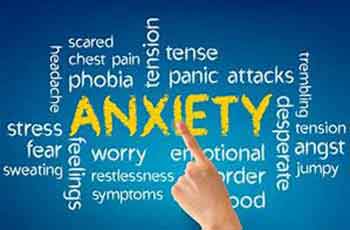
Anxiety
Anxiety is an emotion characterized by an unpleasant state of inner turmoil, often accompanied by nervous behaviour such as pacing back and forth, somatic complaints, and rumination. It is the subjectively unpleasant feelings of dread over anticipated events, such as the feeling of imminent death. Anxiety is not the same as fear, which is a response to a real or perceived immediate threat, whereas anxiety involves the expectation of future threat. Anxiety is a feeling of uneasiness and worry, usually generalized and unfocused as an overreaction to a situation that is only subjectively seen as menacing. It is often accompanied by muscular tension, restlessness, fatigue and problems in concentration. Anxiety can be appropriate, but when experienced regularly the individual may suffer from an anxiety disorder.

People facing anxiety may withdraw from situations which have provoked anxiety in the past. There are various types of anxiety. Existential anxiety can occur when a person faces angst, an existential crisis, or nihilistic feelings. People can also face mathematical anxiety, somatic anxiety, stage fright, or test anxiety. Social anxiety and stranger anxiety are caused when people are apprehensive around strangers or other people in general. Furthermore, anxiety has been linked with physical symptoms such as IBS and can heighten other mental-health illnesses such as OCD and panic disorder. The first step in the management of a person with anxiety symptoms involves evaluating the possible presence of an underlying medical cause, whose recognition is essential in order to decide the correct treatment. Anxiety symptoms may mask an organic disease, or appear associated with or as a result of a medical disorder.
Anxiety can be either a short-term "state" or a long-term "trait". Whereas trait anxiety represents worrying about future events, anxiety disorders are a group of mental disorders characterized by feelings of anxiety and fear. Anxiety disorders are partly genetic but may also be due to drug use, including alcohol, caffeine, and benzodiazepines (which are often prescribed to treat anxiety), as well as withdrawal from drugs of abuse. They often occur with other mental disorders, particularly bipolar disorder, eating disorders, major depressive disorder, or certain personality disorders. Common treatment options include lifestyle changes, medication, and therapy. Metacognitive therapy seeks to diminish anxiety through reducing worry, which is seen as a consequence of metacognitive beliefs.
SYMPTOMS
Anxiety can be experienced with long drawn out daily symptoms that reduce quality of life, known as chronic (or generalized) anxiety, or it can be experienced in short spurts with sporadic, stressful panic attacks, known as acute anxiety. Symptoms of anxiety can range in number, intensity, and frequency, depending on the person. While almost everyone has experienced anxiety at some point in their lives, most do not develop long-term problems with anxiety.
The behavioral effects of anxiety may include withdrawal from situations which have provoked anxiety or negative feelings in the past. Other effects may include changes in sleeping patterns, changes in habits, increase or decrease in food intake, and increased motor tension (such as foot tapping).

The emotional effects of anxiety may include "feelings of apprehension or dread, trouble concentrating, feeling tense or jumpy, anticipating the worst, irritability, restlessness, watching (and waiting) for signs (and occurrences) of danger, and, feeling like your mind's gone blank" as well as "nightmares/bad dreams, obsessions about sensations, déjà vu, a trapped-in-your-mind feeling, and feeling like everything is scary."
The cognitive effects of anxiety may include thoughts about suspected dangers, such as fear of dying. As reported by a patient: "You may fear that the chest pains are a deadly heart attack or that the shooting pains in your head are the result of a tumor or an aneurysm. You feel an intense fear when you think of dying, or you may think of it more often than normal and can't get it out of your mind."
The physiological symptoms of anxiety may include
-
Neurological, as headache, paresthesias, vertigo, or presyncope.
-
Digestive, as abdominal pain, nausea, diarrhea, indigestion, dry mouth.
-
Respiratory, as shortness of breath or sighing breathing.
-
Cardiac, as palpitations, tachycardia, or chest pain.
-
Cutaneous, as perspiration, or itchy skin.
-
Uro-genital, as frequent urination, urinary urgency, dyspareunia, or impotence.
Anxiety disorders and depression are treatable. Many people experience meaningful symptom relief and improvement in their quality of life with professional care.